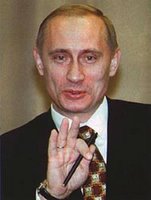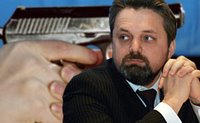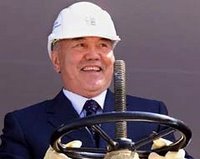 Putin will not run for a third presidential term in 2008. This is a message that he has been repeating every other month over the past years. Still, it was one of the top stories of international media today. Why is it that this is considered so important news as to reach the headlines of respected news sources throughout the globe next to every time that Putin says he will step down from power in 2008? The answer might be that this is the effect of a well-orchestrated media-coup by Putin's political spin-doctors - the political technologists.
Putin will not run for a third presidential term in 2008. This is a message that he has been repeating every other month over the past years. Still, it was one of the top stories of international media today. Why is it that this is considered so important news as to reach the headlines of respected news sources throughout the globe next to every time that Putin says he will step down from power in 2008? The answer might be that this is the effect of a well-orchestrated media-coup by Putin's political spin-doctors - the political technologists.News should always be considered critically by those who receive it. What essentially constitutes news should also be filtered by those whose profession it is - journalists and editors. As the mere term indicates, news should also present something new to its audience. How is it then that something which is news to nobody is repeatedly treated as such?
Should not any journalist in his sound mind defer from reporting what everyone already knows: That Putin does not want to remain Russia's president after 2008. On the contrary, if Putin would declare that he will run for a third presidential term and thus change the constitution, then it would be news of great significance. Until then, this is not the case.
Putin's repeated denial of furher presidential ambitions is perhaps - paradoxically - the main reason why journalists are so susceptible to this message. A climate has been created in which Putin's statement of facts becomes a crescendo of denials in anticipation of the orgiastic eruption when he finally comes out of the closet: "Yes, I will run for a third term! Yes, I will change the constitution! Yes, I cannot live without power! Yes, I am dizzy with success!" Putin's "No" becomes a resounding "Yes!!!" in the ears of media and the public.
That journalists and political analysts alike miss to comprehend Putin's "No" is partly explained by all the rumours that have reverberated throughout Moscow over the years. The question whether Putin will stay in power after 2008 has been a recurrent theme in all political discussions. Still, the answer has been the same all along, namely that the president respects the constitution and thus has no ambtion to change the fact that his tenure of power will end once his term runs out. So, rumours to the opposite must originate from somewhere else. One source might be the president himself by proxy of his "political technologists."
Why might this be the case? Putin has set before himself three tasks: to create and maintain
political stability, produce
economic growth, and gain control over
strategic resources. Here, political stability is perceived a prerequisite for the latter two. In the political area, it is in the best interest of power that a climate of uncertainty prevails on whether Putin will continue in power. As long as this is the case, potential contenders will keep a low profile and nobody of significance will challenge Putin as long as he retains apparent popular support. Thus, Putin avoids running the risk of becoming a lame duck, and his political succession may be handled in an orderly manner by the Kremlin entourage that forms his basis of power. A measure of uncertainty for the public thus becomes an instrument of certainty for power, and thus the political tools for developing economic growth and gaining control over strategic resources is maintained.
Personally, it actually appears that Putin is weary with power and the constant obligations it involves. Associates at times describe him as disinterested with the chores of his office, allocating an increasing amount of time to activities normally not associated with the exercise of power. Also, Putin does not seem to be the sort of politician that thrives on power - to the opposite of what is often claimed in view of his extremely power-oriented policies.
Here also his KGB-background is regarded a reason why Putin would cling on to power, because KGB by essence epitomises power. To assume so may however be to miscomprehend the Chekist culture from which Putin originates. Chekist power tradition sets the system before the individual, and if Putin is true to these ideals he will also be loyal to the constitution as long as power to the system is ensured. His lack of ethics might also be construed in a Chekist context and not as evidence of self-perpetuating personalised authoritarian power.
Finally, why would Putin want to risk another period in office? His presidency has been more successful than what he himself might have imagined. Putin has restored the Russian state as an important actor both domestically and internationally. The country's economy thrives on the enormous incomes from oil, and a measure of stability has been restored to society. Why should Putin risk jeopardising an apparently favourable judgement as the great restorer of the Russian nation that the Russian people and history might pass on him, when the future is uncertain?
So, the question should perhaps be rephrased: "Why should Putin
not step down from power in 2008?" So far, few substantial reasons have been presented why he should stay in power, so the assumption must naturally be that he will leave office.
 Yesterday, deputy head of the Russian Central Bank, Andrei Kozlov, died from gunhot wounds protracted when shot down by armed assailants in central Moscow Wednesday evening. Kozlov is the highest ranking official murdered during president Putin's reign and his assassination now sparks indignation and raises doubts about Russia's fight against organised crime.
Yesterday, deputy head of the Russian Central Bank, Andrei Kozlov, died from gunhot wounds protracted when shot down by armed assailants in central Moscow Wednesday evening. Kozlov is the highest ranking official murdered during president Putin's reign and his assassination now sparks indignation and raises doubts about Russia's fight against organised crime.





